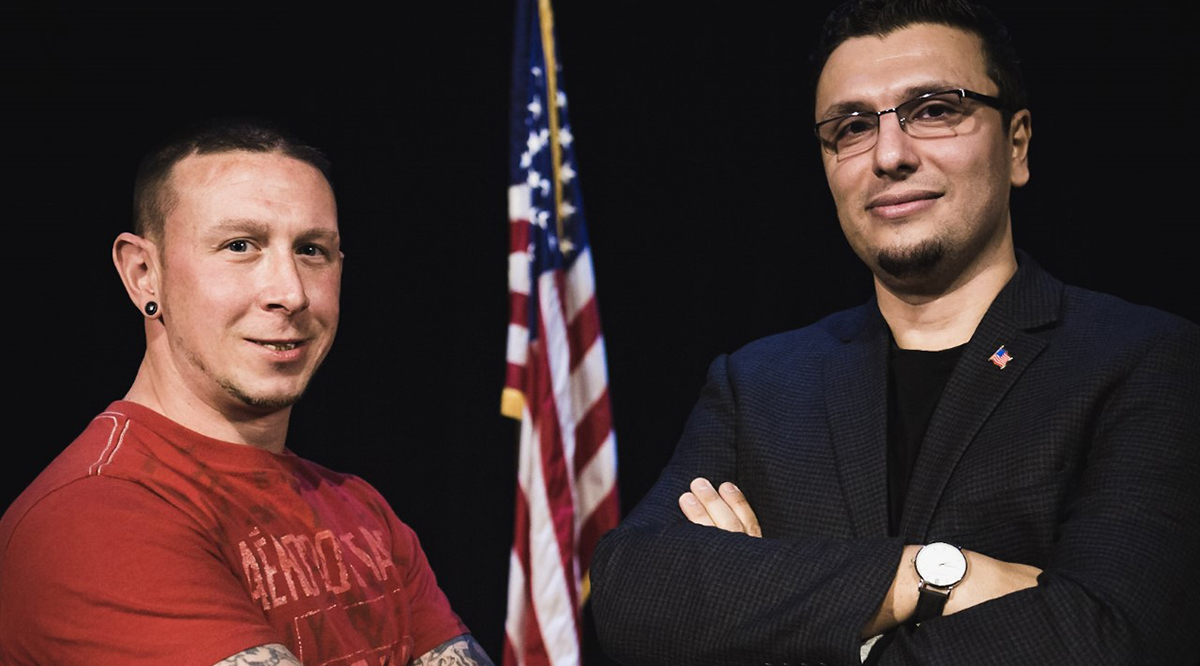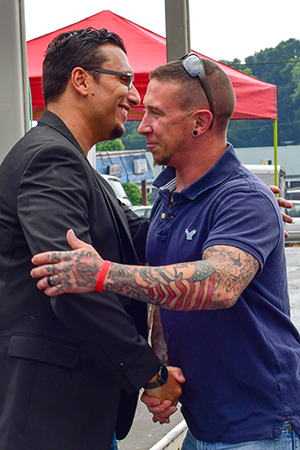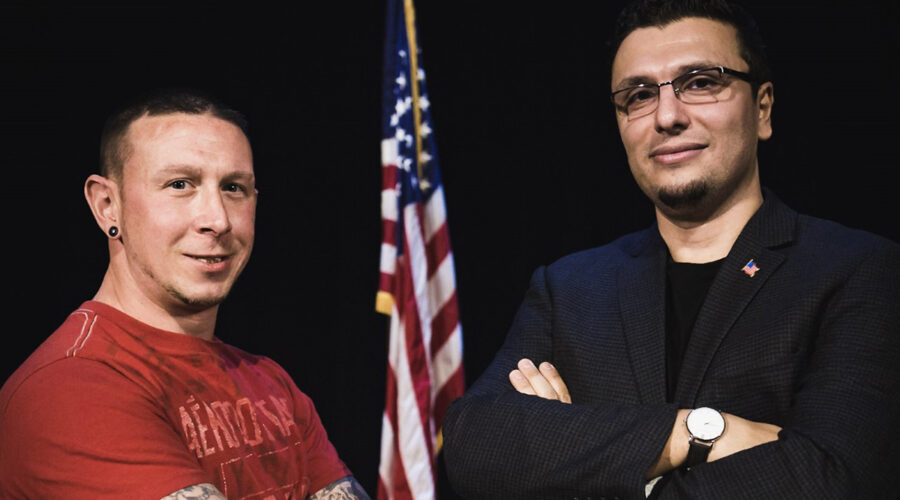
Heval Kelli, MD, grew up amid fear and persecution as a member of the Kurdish minority in Syria. After escaping with his family to Germany at age 11, he spent six years living in overcrowded conditions before finally being granted refugee status by the United States. Over the ensuing decade, with grit and the support of a mentor, Kelli rose to become a prominent cardiologist. Raised a devout Muslim, he still prays five times a day.
Chris Buckley grew up with an abusive father in poor neighborhoods in Georgia and Ohio. Motivated by the attacks on 9/11, he joined the Army and served three tours of duty in Afghanistan. When he got home, fueled by fear, hate, drugs, and a particular antipathy toward Muslims, he joined the Ku Klux Klan. He burned crosses, shouted “White power!” and took his young son to racist rallies.
Today, Kelli and Buckley are the best of friends.
“He is the closest thing I have to a brother,” says Buckley, 39. “We may disagree, we may fight, but we will always love each other.”
At a time when Americans are often split apart by political partisanship, racial tensions, cultural loyalties — and even diverging notions of basic facts — Kelli and Buckley’s story offers a sliver of hope.
That story, told in the documentary Refuge, which is scheduled for release via on-demand services and in select independent theaters in March, covers strange and sometimes torturous ground. It also raises a crucial question: How did they pull it off?

From dishwasher to doctor
Heval Kelli was not yet a teenager when Syrian police stormed into his home, beat him and his mother, and dragged his father, a Kurdish attorney, off to jail. When Kelli’s father was released months later, the family paid smugglers to help them escape their home country and finally made their way to Germany in 1996.
There, Kelli, his brother, and his parents lived for eight months in a refugee camp, and then moved to a small town, Herscheid, where they shared one bedroom and worried endlessly about possible deportation. After years spent filing papers and completing interviews as part of the U.S. asylum-seeking process, Kelli still recalls three wonderful words: “Welcome to America.”
The family settled in Clarkston, Georgia, an Atlanta suburb full of so many diverse immigrants that it’s been called the Ellis Island of the South. Members of a local church soon showed up to provide basics like furniture and clothing and, most important, Kelli says, friendship. “As a Muslim, I never expected to receive all that from a church. The welcome and support were amazing.”
A high school senior, Kelli quickly threw himself into learning English and tackling schoolwork. But Kelli’s father was too sick to work and his mother couldn’t find a job. So Kelli began washing dishes after school, often working 40-hour weeks on top of his schooling.
Meanwhile, Kelli hoped to become a physician but hardly dared to believe it possible. “I didn’t know any doctors. The only time medical professionals came to Clarkson was when there was an emergency,” he says.
In a stroke of good fortune, a professor at Emory School of Medicine in Atlanta learned of Kelli’s interest and reached out to him. With the mentor’s help, Kelli was accepted to and attended Morehouse School of Medicine, also in Atlanta, and then studied both internal medicine and cardiology at Emory. In 2020, he finished his training just a few miles from where he once washed dishes.
Gratitude for his opportunities flows from Kelli. “In this country, you can come in with nothing and make it to the top. That doesn’t happen in many places in the world,” he says.
“I began to notice that people trusted me to do medical tests and procedures on them and their families, but outside the exam room, they didn’t seem to want me here.”
Heval Kelli, MD
Determined to give back, Kelli created several mentorship, educational, and community health projects. One, the Young Physicians Initiative, has provided science education and mentoring support to more than 6,000 middle school, high school, and college students. Soon after the 2016 presidential election, though, Kelli felt a strong pull in another direction: to represent Muslims, refugees, Black and Brown people, and others subjected to mistreatment or misunderstanding.
“I began to notice that people trusted me to do medical tests and procedures on them and their families, but outside the exam room, they didn’t seem to want me here,” says Kelli. “I knew I needed to do more.”
Kelli looked for chances to speak at churches, schools, and local groups like the Rotary Club. He hosted an iftar — the traditional meal for ending Ramadan fasts — where hundreds broke bread together. Even minor or informal interactions could lead to healing, he believed.
“It’s hard to hate somebody you know,” he says.
Throughout, Kelli found that his medical training bolstered his outreach efforts. For one, he had learned how to listen well. He also knew not to take someone’s reaction too personally. “Sometimes, a patient is angry because they’ve had to wait or because they’re in pain. I just say, ‘I understand how you feel,’” says Kelli. “Acknowledging people’s pain builds trust.”
But all of Kelli’s lessons would soon be tested. Anti-extremism leader Arno Michaelis, whom Kelli met at a conference on Islamophobia, challenged him to go further. “Are you really serious about doing this work?” he asked. If so, Kelli needed to meet Chris Buckley.
From Afghanistan to the Klan
Chris Buckley’s body is covered with tattoos: a sinister skeleton head, symbols of the Ku Klux Klan on his knuckles, and a massive one on his arm that proclaims him an infidel in Arabic.
Buckley got that last one in Afghanistan. He wound up stationed there in 2001 after opting to enlist in the Army rather than pursue college. “I had a sense of obligation to avenge what had happened on 9/11,” he says.
Once there, target practice regularly relied on Muslim images and survival meant dehumanizing the enemy.
“So much of my hate was trauma-related, and hate was easier than facing my pain. Hate became my drug. It was how I coped.”
Chris Buckley
Then Buckley experienced a fateful trauma: the shooting of a close friend during a patrol. “I said, ‘I got you buddy,’ pulled him in, and put pressure on the wound,” Buckley recalls. But the young man died in his arms. “At that moment, I started to feel intense hatred of Muslims,” he says.
Previous childhood experiences had also poured venom into Buckley’s veins. His father, an alcoholic, spewed prejudice-filled notions: Immigrants were stealing jobs, Black people were milking welfare, and homosexuality was immoral. That last idea was painfully cemented in Buckley’s mind by numerous sexual assaults perpetrated by a male relative.
“So much of my hate was trauma-related, and hate was easier than facing my pain,” he says. “Hate became my drug. It was how I coped.”
Buckley’s life spiraled down even further after a back injury — he was on an Army humanitarian mission in 2009 in Kentucky following massive storms when his Humvee went off the road — left him addicted to opioids and other drugs.
All this made him ripe for the Klan, which offered a sense of support and purpose. He officially joined in 2014, and soon was teaching fellow members how to conceal weapons and take down an enemy.
But Buckley’s wife grew increasingly uncomfortable with his membership, and eventually reached out to Michaelis for help. After months of talking with Michaelis — and with his wife threatening to leave — Buckley became ready to give up the group.
Relinquishing his beliefs was tougher, though. “I still wanted something to explain the hurt I was carrying with me. I wanted to continue to hate Islam,” he says. “Meeting a Muslim was off the table.”
Coming together
After Michaelis made the Facebook introduction, Kelli started with a few brief messages, things like, What’s up? How are you? Happy New Year.
“I was just sincere and friendly. I had no agenda,” he says.
The simple messages wore down some of Buckley’s resistance. When Buckley finally replied, the two found they had a lot in common. They both were married, had kids, and were the same age. But the greatest similarity was that they both loved the United States.
“[Chris’s] image was that Muslims and refugees don’t really like this country, that they just want to take advantage of it. He was surprised by how much love I have for this country,” Kelli recalls.
Soon the two moved on to phone conversations, including one that Buckley calls his 45-minute rant about gun control. If conversations crossed a boundary, they would let the other know. “We apologize. We don’t get defensive,” says Buckley.
Finally, after many phone calls, in 2018 the two met in person, at Buckley’s home in the 8-square-mile town of Lafayette, Georgia.
As Kelli made the two-hour drive, Buckley battled nerves. “[My family] shared a shack with roaches and rats,” says Buckley, who then was working as a machine mechanic in a carpet mill. “I was embarrassed.”
On his end, Kelli found the visit eye-opening. “They lived in the middle of nowhere, with almost nothing. To see that [poverty] in America really touched my heart.” Suddenly, Kelli could better understand some people’s resentment toward immigrants like him.
“Anger together with fear creates hate,” he says.
The incident also made an impression on Buckley. “Heval said, ‘I can see why you might hate refugees who come here and get assistance,’” he says, recalling deep gratitude for Kelli’s empathy. “I remember I cried,” says Buckley.
That sense of being understood and Kelli’s support were crucial to his recovery, Buckley says. “It takes somebody to show us how lost we’ve gotten. Heval is that person for me.”
Buckley’s recovery path covers much ground. He’s been drug-free for five years, and has built a solid relationship with his wife as well his son and daughter, now ages 8 and 11. He has worked for Parents4Peace, a Memphis-based anti-extremism nonprofit that helps extract people from hate groups, for three years. He also created a recovery program for veterans and others who have suffered trauma.
Meanwhile, his friendship with Kelli continues. In fact, the two speak every week, and their families go out for Middle Eastern food whenever the Buckleys make the trip into Atlanta.
And as they have for years now, they are working to use that friendship to benefit others. They have spoken together in churches, schools, and elsewhere, including in a town that had been the site of a neo-Nazi gathering the year before. So far, Kelli estimates that at least a thousand people have heard them.
Kelli, who feels tremendous admiration for Buckley, calls such work crucial.


